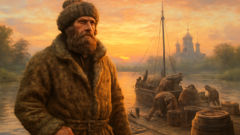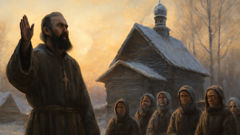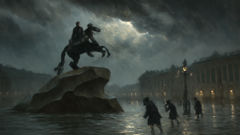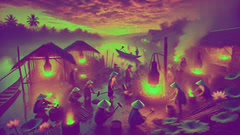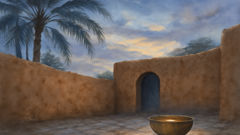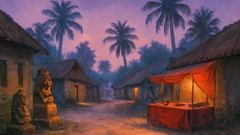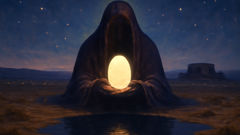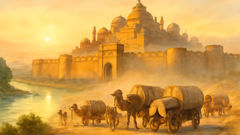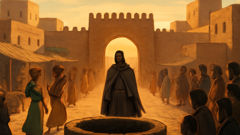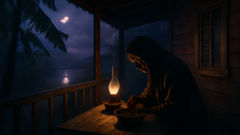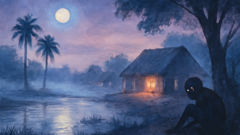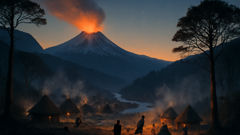Introduction
In the spring of 1466, as the melting snow revealed muddy roads and the distant tolling of church bells echoed across the Volga, Afanasy Nikitin stood on the wharf in Tver. His beard was streaked with early gray, his leather boots were patched at the toe, and his eyes—blue as the river ice—held the wary hope of a merchant bracing for the unknown. Russia was changing; Ivan III’s rule pressed outwards, and whispers of distant lands—golden markets, fragrant spices, and silk-shrouded wonders—filtered through the bustling bazaars. Yet for most, the world ended at the edge of the Black Sea or in the shadows of the Caucasus. Nikitin, humble horse trader and scribe, harbored grander ambitions. Armed with ledgers, sturdy courage, and the memory of a family left behind, he boarded a creaking riverboat bound for Astrakhan, his heart set on traversing the world beyond three seas: the Caspian, the Persian Gulf, and the Indian Ocean. What began as a commercial mission would become a journey of survival and discovery—testing his faith, transforming his mind, and forging his name into legend. As clouds gathered and the vessel’s prow shuddered into the current, Nikitin’s thoughts danced between anxiety and awe. He could not have imagined the tapestry of cities and cultures that lay before him: the Persian court’s shimmering minarets, the sun-baked villages of Gujarat, the riotous festivals of Bahmani India. Danger lurked at every crossroads, from Tatar raiders to monsoon tempests. Yet Nikitin pressed on, compelled not only by trade but by a restless hunger to witness the world’s wonders with his own eyes and inscribe them for those who could not. His path would lead him across deserts and mountains, through bustling ports and sacred temples, where every word spoken and coin exchanged was a thread in the grand weave of the Silk Road. By journey’s end, Nikitin would be more than a merchant—he’d become a chronicler of civilization, a bridge between distant worlds, and a symbol of human perseverance. This is the story of his voyage—one of hardship and hope, of faith and doubt, and of a singular man’s determination to cross the frontiers of the known world.
Across the Volga: Trials of Departure and the Road to Astrakhan
Nikitin’s voyage began not in a burst of adventure but in the pragmatic bustle of trade. Tver’s markets in the 1460s overflowed with furs, honey, and rough-hewn iron. Yet beneath the commerce, anxiety simmered. The Tatars to the south controlled key river passages, and every journey was a gamble with fate. Nikitin’s small caravan included two fellow merchants—Maksim, a seasoned trader with a knack for languages, and young Stepan, whose eager laughter masked his nerves. Their boat, patched and weathered, groaned with cargo: packs of sturdy Russian horses destined for foreign buyers. As the Volga unfurled before them, the banks teemed with life—peasants plowing thawed earth, fishermen hauling nets, Orthodox monks blessing travelers at makeshift shrines. The air was thick with the scent of wet earth and woodsmoke. Nikitin kept meticulous notes, describing not just goods but gestures, dialects, and customs: “Here, in Kostroma, the women tie bright ribbons in their hair. In Nizhny Novgorod, Tatar traders haggle over silver bracelets. The world is wider than any map drawn in Moscow.”
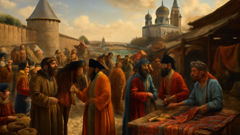
They sailed for weeks, navigating tributaries and stopping at riverside settlements. At night, the merchants camped on shore, eating black bread and onions by the fire while sharing tales of lost fortunes and ghost-haunted forests. One evening, as they drifted near Kazan, disaster struck. A band of Tatar horsemen appeared on the far bank, their banners snapping in the wind. With practiced efficiency, they crossed the shallows and demanded tribute. Maksim argued bravely, but the Tatars seized two horses and a cask of honey. Nikitin watched the moonlit confrontation with a mix of fear and fascination—here was the world’s unpredictability made flesh. Afterward, Stepan confessed he nearly fled into the woods. “We’re not made for such journeys,” he whispered. “But neither is Russia, not yet. Perhaps that’s why we must go.”
The river broadened and the air grew heavy with southern heat. By the time they reached Astrakhan, the city was a confusion of languages—Russian, Persian, Tatar, and Armenian—and the markets throbbed with merchants from every corner of Eurasia. Here, Nikitin first glimpsed the vastness of the world he’d only read about: Persian envoys in silk turbans, Indian traders displaying nutmeg and cloves, camel caravans bound for Samarkand. In crowded inns, Nikitin sipped thick coffee and listened to legends of distant lands. Each story stoked his curiosity and unease in equal measure.
Astrakhan was a city of thresholds—a last outpost of Russian influence before the borderless expanse of the steppe and desert. In the shadow of the city’s mudbrick kremlin, Nikitin finalized deals and repacked his remaining goods. The next stage—crossing the Caspian Sea—would be perilous. He sought guidance from an old Armenian merchant, whose wrinkled fingers traced invisible routes in the air. “There is profit in danger,” the man said, “but also truth. Beyond the sea lies Persia, a world of wonders and perils. Trust your eyes. Trust your faith. But above all, trust the journey.”
With these words echoing in his mind, Nikitin bade farewell to his companions—Maksim chose to return home, while Stepan, emboldened by their trials, resolved to follow Nikitin onward. Their boat joined a motley flotilla: battered Russian craft, Persian merchant ships, and Tatar raiders’ swift galleys. The Caspian’s waters were fickle—sometimes placid, sometimes whipped into froth by sudden gales. Nikitin chronicled every moment, every fear, and every prayer. “Between one world and the next,” he wrote, “a man is made anew.”
Through Persian Sands: Dangers, Hospitality, and the Gardens of Shiraz
Crossing the Caspian, Nikitin’s party arrived at Derbent—an ancient stone gateway flanked by mountains and the sea. Here, the Silk Road’s arteries pulsed strongest. Nikitin marveled at the city’s fortifications, its inscriptions in Arabic, and the way voices echoed between its narrow alleys. Traders from Samarkand and Baghdad rubbed shoulders with Mongol horsemen and Russian pilgrims. The group rested at a caravanserai, its courtyard perfumed by roasting lamb and burning incense. That night, beneath a starry sky unspoiled by lamps, Nikitin penned a line that would stay with him: “Every city is a world, and every world is a city.”
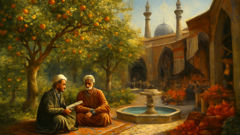
The journey south was grueling. The landscape changed from lush riverbanks to arid hills and salt flats. Dust coated clothes and stung eyes. In Resht, Nikitin encountered Persian poetry for the first time—recited by a gray-bearded scholar who compared love to the flight of a nightingale. Nikitin couldn’t understand every word, but the melody enchanted him. The Persians, he wrote, “live with poetry as we live with snow.”
Danger was never far. Near Qazvin, bandits attacked a merchant convoy. Nikitin’s group avoided disaster only through the intervention of a passing emir, who demanded a fee for their protection. Though suspicious, Nikitin paid—learning that in Persia, alliances were as valuable as coin. Yet not all encounters were grim. At a village on the edge of the desert, a local family offered flatbread and pomegranate wine. The children giggled at Nikitin’s strange Russian prayers, and their mother pressed rosewater on his forehead as a blessing.
Shiraz marked a turning point. The city shimmered in the spring sun, its gardens bursting with roses and orange trees. Minarets pierced the sky, and the muezzin’s call mingled with the laughter of children chasing kites. Nikitin wandered through bazaars alive with color: carpets woven in geometric dreams, brass lamps casting patterns on dusty walls, pomegranates piled high beside heaps of dates and figs. He visited the tomb of Hafez and stood silent before its marble slabs, watching local poets compose verses to the music of reed flutes. Nikitin envied their ease with words, their sense that life was poetry embodied.
The stay in Shiraz offered rest but also homesickness. Nikitin’s diary from this period is filled with longing for Russia—the taste of rye bread, the bells of Tver, the laughter of his daughter. Still, he pressed on. Trade opportunities beckoned; so did rumors of distant India. “I am but a guest in this world,” he wrote, “yet I am welcomed everywhere by those who know the hardships of the road.”
As they left Shiraz for Hormuz, Nikitin’s party grew: an Armenian trader named Levon joined them, seeking pearls in Indian waters, as did Faridun, a Persian horse dealer whose wit charmed every checkpoint guard. The journey to Hormuz skirted the desert’s edge—days of searing heat and nights cooled by starlit breezes. At every stop, Nikitin collected stories: a blind storyteller who recited Alexander’s conquests from memory; an old woman who claimed to have seen the Mongols ride through in her youth. Each encounter was a window into history and possibility.
Finally, the blue shimmer of the Persian Gulf appeared on the horizon. Hormuz—city of pearls and pirates—beckoned like a mirage. Nikitin’s heart quickened; ahead lay the greatest sea he had ever known, and beyond it, the fabled riches and mysteries of India.
The Indian Monsoon: Encounters with Faith, Power, and Wonder
Hormuz was a city suspended between earth and water—a place where trade ships from Arabia, China, and India clustered like gulls at the wharf. Its bazaars were dazzling: pearls gleamed on velvet cushions, spices perfumed the air, and voices shouted in a cacophony of Persian, Arabic, Gujarati, and Russian-accented trade pidgin. Nikitin spent days negotiating for safe passage and bartering his remaining horses for pepper and indigo dye. The sea’s vastness daunted him. “Never have I seen such an expanse,” he wrote. “It is as if the sky has been poured into the earth.”
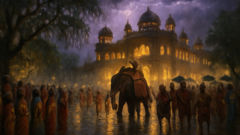
He boarded a dhow bound for Chaul—a Gujarati port famed for its textiles and temples. The Indian Ocean was mercurial: days of blazing sun alternated with nights when storm clouds whipped waves into mountains. Nikitin, seasick and soaked, clung to his faith and his notebooks. The ship’s crew, Hindu and Muslim alike, prayed to different gods before each meal. Nikitin found himself drawn into their rituals—not out of belief but out of solidarity in danger.
Landfall in India was like awakening in a dream. Palms lined the shore, monkeys shrieked in banyan trees, and the air buzzed with unfamiliar birdcalls. In Chaul, Nikitin was greeted by a cacophony of colors: women in bright saris balancing baskets atop their heads; priests daubed with ash and vermilion; markets brimming with mangoes, tamarind, and jasmine garlands. Nikitin’s arrival caused a stir—the first Russian most had ever seen. Children followed him, chanting rhymes and giggling.
Overland, Nikitin’s caravan traveled south and east through a land transformed by the monsoon. Rivers overflowed their banks; rice paddies shimmered in the rain. He marveled at the Bahmani Sultanate’s grandeur—palaces of red sandstone, domes painted with peacock feathers, and gardens where elephants bathed at dusk. In Bidar, he witnessed a royal procession: soldiers in chainmail, dancers twirling with swords, nobles riding caparisoned horses. The sultan’s court was a world unto itself: Persian scholars debated philosophy, Sufi mystics spun in trance, and Hindu astronomers mapped the stars.
Religion was everywhere and everything. Nikitin attended Hindu festivals where thousands thronged temple steps, drums thundered through the night, and lamps floated down sacred rivers. He watched Muslims pray in marble mosques and listened to Jain monks preach nonviolence beneath bodhi trees. Nikitin was often an outsider, sometimes tolerated, sometimes tested. Once, in a village near Goa, he was accused of spying; only his fluency in trade languages and his battered Russian prayer book saved him.
The months passed in a whirl of marvels and challenges. Nikitin’s diary swelled with observations: “The people of India are many and their customs diverse. Their coins bear unfamiliar gods. Their laws are strict yet their hearts generous. I have eaten rice with Brahmins and drunk wine with Persians. I have seen gold measured by weight, not by count.”
Yet not all was wonder. Nikitin struggled with loneliness and doubt. Cut off from Orthodox rites, he feared for his soul’s salvation. He missed Russian winters, his wife’s sour cabbage soup, his daughter’s laughter. The journey changed him—not only as a trader but as a man. “I am neither wholly Russian nor Indian now,” he wrote. “I am what the road has made me.”
As he prepared to return, Nikitin knew he could never truly go back—not to the man he was, nor to the Russia he remembered. But his notebooks brimmed with stories: of kings and beggars, temples and tides, and the ever-turning wheel of fate that drove men beyond three seas.
Conclusion
Nikitin’s return journey was slower, shadowed by exhaustion and loss. The world he had traversed—so vast, so alive—felt both familiar and impossibly distant as he retraced his steps through Persian deserts and back to the muddy banks of the Volga. Much had changed: trade routes were disrupted, old friends had vanished, and his homeland felt altered by distance more than time. Yet within him, an inner landscape had opened wider than any steppe or ocean. He carried with him more than goods or profit—he bore the weight of stories, scents, faces, and faiths that had remade his heart. His chronicles survived, scratched on battered pages stained by rain and sweat. They spoke of marvels few Europeans had seen: the splendor of Shiraz’s gardens, the thunderous monsoon over Bidar’s domes, the ceaseless exchange of languages and hopes at every border. Through hardship, Nikitin’s perseverance transformed isolation into understanding. He had set out as a merchant but returned as a bridge—a witness to humanity’s shared longing for wonder and belonging. His tale endures because it is not merely one man’s adventure; it is the eternal human urge to cross boundaries, to see with new eyes, and to bring home a vision that widens the world for all who come after.

